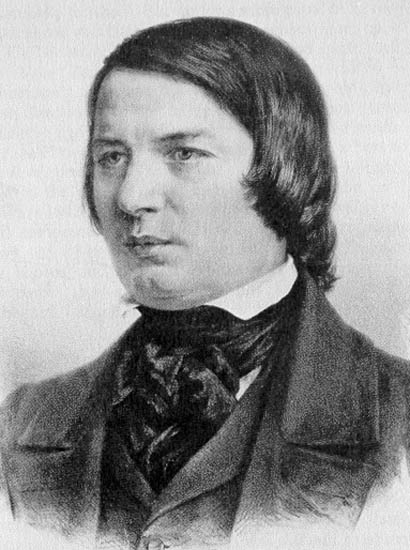|

Robert Schumann
b.Zwickau,Germany 8 June 1810
d.Edenich,Germany 29 July 1856
Robert Schumann was born the son of a bookseller and publisher. From his father's library, the young Schumann fell in love
with literature and at one point was even considering a career as a poet. However, he showed immense interest and ability
for the piano too, he was able to improvise "sketches" depicting his friends, on the instrument. We are to see the
young man combining his two loves in his eventual career as a composer, writing music that always contain strong literary
influences.
It is puzzling why Schumann took up law in University (probably to please his mother). But it
is no surprise that he neglected his studies and spent all his time on music. Eventually, he gave in to his heart and began
serious piano study in 1830 with Friedrich Wieck, the most prominent teacher then, with the intention of becoming a piano
virtuoso. Unfortunately for him (and luckily for us), a finger ailment forced him to give up his initial intent, but enabled
him to concentrate on composition. In the 1830s, his compositions were mainly for the piano, amongst them the very popular
Kinderszenen "Scenes from Childhood". At the same time, Schumann fell in love with the pretty and innocent Clara,
daughter of his teacher, who was a virtuoso pianist and a composer in her own right. The elder Wieck however severely opposed
the union (probably because of Schumann's family history of mental problems) and Schumann had to take him to court to legalize
the marriage (the only instance where Schumann's legal knowledge came in handy!).
The year of their marriage
(1840) was a happy year for Schumann, and his creative and melodic powers were at their height. From that year came an outpouring
of lieder (the German song), many of which describes the joy of love. In the ensuing years, Schumann turned to other genres,
writing orchestral, chamber and choral music. He also obtained a teaching post in the newly-founded Leipzig Conservatory.
All seemed well for the Schumanns, Robert was a successful composer and Clara was winning the world as a pianist. However,
tragedy was soon to struck.
Schumann, ever the sensitive man, already had suffered bouts of depression in
the late 1830s. Although he seemed to have recovered then, the mental discomforts returned in the mid 1840s, hampering his
creativity. In 1850, he took up a conducting post in Dusseldorf but was ill-suited to the responsibilities, being unable to
excercise authority on the orchestra. From then on, his health and spirits failed rapidly. He suffered hallucinations and
in 1854, he threw himself into the Rhine river but was rescued by fishermen. At his own request, he was put up in an asylum
in Edenich where he died an insane man in 1856.
Schumann was one of the most important composer of German
romanticism. His literary bent was realized in his often descriptive music, where he came up with fanciful titles for his
compositions. Forms meant little to him, melodic spontaneity and exuberence was everything. His piano music are the staple
of every pianist today and his songs could be ranked side by side Schubert's. Although his orchestral music is often critisized
for the thick scoring and lack of fluency, the spontaneity of his writing never fails to win over the audience. In his time,
he contributed to the musical circle through his perceptive and witty writings in the local music journal. He also encouraged
and helped launched the careers of many young composers such as William Sterndale Bennett and especially, Johannes Brahms.
In our time, we will never fail to be delighted by the youthfulness and refreshing quality of his many lovely compositions.
|



